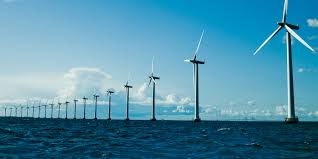The word “shpilkes,” which refers to a state of agitated anxiety, is probably unfamiliar to most non-Yiddish speakers. I am not a Yiddish speaker, but like many of us above a certain age I learned the word watching Saturday Night Live in the early 1990s. Shpilkes is a relative of the notion of cognitive dissonance, the anxious discomfort we feel when faced with conflicting (dissonant) ideas.
Both ideas suggest feelings that are sufficiently powerful to produce a physical reaction. We feel impelled to relieve that discomfort that cognitive dissonance produces — that is, to reject or avoid the new, dissonant idea — because our discomfort is powerful. But, for anyone who wants a full understanding of complex national problems that require a political solution, including climate change, that dissonance comes with the territory.
As the election nears, these feelings lead some to want to suppress discussion of inconvenient truths rather than to acknowledge and contextualize them. This is an understandable and human response. But it probably doesn’t help the cause it tries to serve (about that, see here, here and here).
We are seeing more and more viral memes that mock or shut down discussion of questions some voters have about Kamala Harris’ policy positions, based on the notion that whatever one might not like about Harris or her campaign it pales in comparison to the disastrous consequences that another Trump presidency would bring. Social media is full of that sort of thing. For a more serious example, see here. But it would be much better to hear out the questions or criticism, and then contextualize them, the way Todd Purdum did here or Sammy Roth did here.
So learn to accept and manage the shpilkes. It is a necessary part of learning about the kind of complex issues that the energy transition has in spades. Accept the discomfort, and dig deeper into its causes. And when you have that kind of deeper understanding of a political problem, you will be less likely to misjudge or misunderstand the energy transition challenge.
For example, recently politicians in the State of Connecticut have been facing a dilemma. On the one hand, they want to hasten the transition to a much lower carbon energy mix. That goal is popular with voters, and in 2018 and 2022 the state enacted relatively aggressive targets for reducing carbon emissions. On the other hand, both the state and the New England region remain heavily dependent on natural gas for electricity, and more generally on fossil fuels for heat.
The local terrain, population density, and local opposition have slowed development of renewable energy projects there. Connecticut would benefit from plans to bring relatively cheap Canadian hydroelectric power into the region, but attempts to build the necessary transmission lines have been halting, delayed by local opposition. Which is why several New England states have been discussing coordinated development of offshore wind to reduce electricity sector carbon emissions.
In 2023 Connecticut, Massachusetts and Rhode Island signed an agreement to coordinate development of offshore wind and associated transmission and other necessary infrastructure. But now Connecticut’s leaders may be having second thoughts about that idea (see here and here).
Why? Because offshore wind is expensive, and Connecticut’s electricity rates are already among the highest in the nation. And because politicians know that while voters value a cleaner electricity mix, they value an affordable (and reliable) one even more.
The irony is that high prices in Connecticut (and New England) are traceable to the region’s dependence upon natural gas for electricity generation, and to other policy choices the state has made. When demand for gas or electricity spikes, the region has a difficult time importing additional supplies because of longstanding bottlenecks in the import delivery system. This produces lots of price volatility and regular periodic high prices. Most New Englanders don’t want new gas pipelines. (Neither do the New Yorkers through whose state new pipelines would have to pass.)
So, to mix two metaphors, Connecticut must choose its poison; it cannot have its cake and eat it too. If it wants to prioritize lower carbon electricity supplies, it can build more offshore wind. If it wants to prioritize lower energy prices, it can build more natural gas import infrastructure. If it wants a little more of both, it can build infrastructure to import cheaper clean electricity from outside the region and/or build more onshore wind and solar farms. But whatever it chooses, politicians there will face a lot of agitated, anxious energy from some important constituency.
Shpilkes.
For those of us who want to see New England get to a lower carbon energy system, this kind of hesitation on the part of politicians can be frustrating. And we will be invited by pundits and writers in the online world to attribute that hesitancy to the backroom political influence by utilities or some other form of corruption, or to a lack of moral courage on politicians’ part, or to some other uncharitable impulse. Those invitations will look attractive because it helps relieve our dissonance to reject the possibility that there may be a good reason why some people don’t want what we want.
But we should resist that temptation to judge in that way.
First, the rest of us don’t risk losing our jobs by making decisions that might increase electricity rates; politicians and policymakers do. Voters whose energy supply is too expensive or too unreliable are much more likely to turn their elected representative out of office than those whose energy supply is too dirty.
Second, the cost impacts of buying offshore wind will be felt more acutely by those at the bottom end of the socioeconomic ladder. The voters who prioritize environmental impacts over energy costs tend to be relatively well off; as do the people who show up to oppose new onshore wind farms, solar farms and transmission lines. Politicians know all this.
So cut those politicians a break. Don’t let others help you get rid of your dissonance, your discomfort, by judging them harshly. Perhaps you will feel better, but it comes at the cost of the truth. If you want that deeper understanding, embrace that discomfort. Take it as a signal that you have discovered a deeper truth about the energy transition that is worth exploring further. — David Spence



